Carl E. Olson's Blog, page 135
August 26, 2013
Preaching IN and TO a Post-Modern World
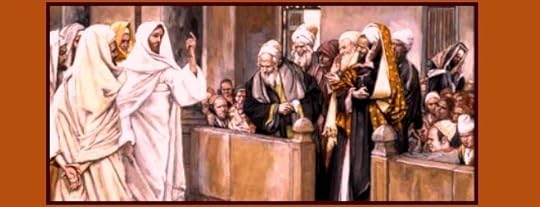
Preaching IN and TO a Post-Modern World | Dr. Josh Genig, Ph.D. | HPR
Indeed, preaching must be improved. However, before preaching can be improved, one must first be aware of the cultural context in which one lives today.
Over the past few years, a staggering reality has surfaced: many
individuals leaving the Church are doing so because of the quality of
the preaching. 1
This indicates, at least in part, the impetus for the rare words of
chastisement from Pope Benedict XVI in his post-synodical apostolic
exhortation, Verbum Domini:
In the Apostolic Exhortation, Sacramentum Caritatis,
I pointed out that “given the importance of the word of God, the
quality of homilies needs to be improved. ….” … Generic and abstract
homilies which obscure the directness of God’s word should be avoided,
as well as useless digressions which risk drawing greater attention to
the preacher than to the heart of the Gospel message. The faithful
should be able to perceive clearly that the preacher has a compelling
desire to present Christ, who must stand at the center of every homily. 2
Indeed, preaching must be improved. However, before preaching can be
improved, one must first be aware of the cultural context in which one
lives today. What are its characteristics? What are its needs? And
how can the one entrusted with the task of preaching (ordinarily the
priest and deacon) better engage those living within that particular
cultural milieu?
I will attempt to address the foregoing questions in what lies
below. However, once our cultural context has been established (as best
as is able), it will be important to recall the homiletic of the recent
past before forging ahead with a proposed homiletic for this
post-modern world. With that former homiletic in mind, I will then
examine the troubles associated with such an approach, particularly in
light of the post-modern world we are attempting to evangelize with the
good news of the Gospel of Jesus Christ. Finally, and most important
of all, I will attempt to demonstrate how preaching can and should be
improved in order to meet more adequately the spiritual needs of a
post-modern world that is dying to live.
The World Today
If you take a long look around, what do you see? What is it
that defines our culture? What motivates our young people? What brings
us satisfaction?
Continue reading at www.HPRweb.com.
August 25, 2013
Orthodoxy and Doxology
Orthodoxy and Doxology | W. Patrick Cunningham | HPR
Orthodoxy is both right praise and right teaching. Orthodox understanding of, and adoration of, the Blessed Trinity is the most critical component of our unity in Christ.
St. Paul’s letter to the Ephesians (1:12) reminds us that in Christ, those who “first hoped in Christ have been destined and appointed to live for the praise of {Christ’s} glory.” The Fathers of Vatican II, in Sacrosanctum Concilium, used this passage in their summary of the worship inspired by the Holy Spirit, the Church’s celebration of the paschal mystery (art. 6). When the Fathers called the sacred liturgy “the summit toward which the activity of the Church is directed,” they recapitulated that worship as the baptized faithful “{coming} together to praise God in the midst of his Church, to take part in the sacrifice, and to eat the Lord’s supper.” This is right worship as intended by Christ and the Apostles. The word literally translated “right worship” is orthodoxy.
This word has acquired, over the centuries, multiple extended meanings. The best known use is by those churches which have maintained valid orders, but are not in communion with the Holy Father. These are called “Orthodox churches.” They have valid sacraments and so continue the “right praise” of the early Church. By and large, their teachings are in conformity with those of the Roman Church.
The other important meaning of “orthodoxy” is “right doctrine.” This may actually be a more common understanding than the literal one. But right doctrine and right worship are intimately connected. The bishops of the United States stated as much in the reflection for Catechetical Sunday in 2009. In an article authored by Fr. Rick Hilgartner, they wrote: “The original version of the phrase, ‘ut legem credendi lex statuat supplicandi’ (‘that the law of praying establishes the law of believing’), highlighted the understanding that the Church’s teaching (lex credendi) is articulated and made manifest in the celebration of the liturgy and prayer (lex orandi). We understand this to mean that prayer and worship is the first articulation of the faith. The liturgy engages belief in a way that simply thinking about God, or studying the faith, does not naturally do. In other words, in an act of worship, the faithful are in dialogue with God, and are engaged in an active and personal relationship with Jesus Christ, and every individual member of the liturgical assembly is connected to one another as members of the mystical Body of Christ in the Holy Spirit, as they look together with hope for the salvation promised in the Kingdom of Heaven.”
Now the fundamental doctrine, or central mystery (The Catechism of the Catholic Church§234) of the Catholic faith, is the teaching on the Blessed Trinity.
August 24, 2013
How narrow is the way of the Cross?
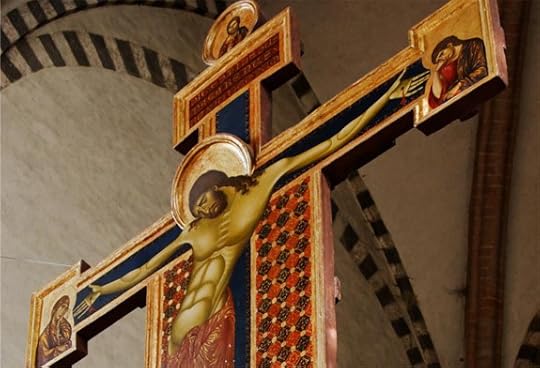
"Crucifix" by Byzantine artist, Cimabue (1272).
A Scriptural Reflection on the Readings for Sunday, August 25, 2013 | Carl E. Olson
Readings:
• Is 66:18-21
• Ps 117:1, 2
• Heb 12:5-7, 11-13
• Lk 13:22-30
Over the past few weeks we have heard,
in the readings from the Gospel according to St. Luke, about Jesus
journeying up to Jerusalem to face arrest, suffering, and death (cf.
Lk. 9:22, 43-45). Along the way he was spurned by a Samaritan
village, he sent out seventy disciples to proclaim the kingdom of
God, he told the parable of the Good Samaritan, and he visited Mary
and Martha. He also taught about prayer, hypocrisy, riches, and
vigilance.
As varied as these matters were, they
all were addressed with a singularity of purpose, for the good
shepherd was working to gather in lost sheep while demonstrating that
he was the promised Messiah who would deliver the remnant of faithful
from spiritual exile. His Passion would reveal the deeper meaning of
his teachings, and his death and resurrection in Jerusalem would
point the way to the heavenly banquet in the new Jerusalem. This is
what Ad Gentes, the Vatican II decree on mission activity of
the Church, called “narrow way of the cross.”
In today’s reading we hear that as
Jesus made his way through “towns and villages” someone asked,
“Lord, will only a few people be saved?” It appears to be a fair
enough question. In fact, haven’t we all, at one time or another,
wondered the same thing? How many will be saved? Most? Only a few?
What about my neighbor? My boss? So it is a bit bracing to read
St. Cyril of Alexandria’s comment that Jesus “is purposely silent
to the useless question.” Cyril pointed out that Jesus refocuses
the man’s attention—and our attention as well—on the questions
that should concern us. “He proceeds to speak of what was
essential, namely, of the knowledge necessary for the performance of
those duties by which people can enter the narrow door.”
Today’s Old Testament reading, from
the conclusion of the Book of Isaiah, seems to present something of a
paradox when put alongside the Gospel. Isaiah foretold of a coming
time when God would widen the way of salvation to include Gentiles
from “the nations.” This, in fact, had been his intention all
along, as his covenant with Abram indicated: “…and by you all the
families of the earth shall bless themselves” (Gen. 12:3). Yet even
more surprising was the declaration through Isaiah that some of those
Gentiles would become priests. This gathering of the nations would
establish a new family of God—the Church—free of ethnic criteria.
These people, Jesus stated, will come from all four corners of the
earth “and will recline at table in the kingdom of God.”
Yet each of them will have to enter
through the narrow gate, and many will fail for lack of strength. In
considering this, we must recognize that the graciousness of God’s
call is not incompatible with the difficulty of the journey. All that
is good and worthwhile requires effort, fidelity, and sacrifice.
Jesus warns, as he did many times, that being born into the family of
God does not exempt anyone from striving, by God’s grace, to be a
true son and daughter of God. Being baptized as a baby doesn’t
allow anyone to remain a spiritual baby, but grants divine life that
is meant to grow and mature. And, as the Epistle to the Hebrews
teaches, those who are sons will undergo discipline and experience
trials, which eventually “brings the peaceful fruit of
righteousness.”
Some of the Jews rejected God’s
discipline via the physical Exile and so remained in spiritual exile.
We, too, can turn away from God’s reproval and lose our way.
Confession, prayer, and Holy Communion are essential for our
spiritual health and growth. “Thus from celebration to
celebration,” states, the Catechism, “as they proclaim the
Paschal mystery of Jesus ‘until he comes,’ the pilgrim People of
God advances, ‘following the narrow way of the cross,’ toward the
heavenly banquet, when all the elect will be seated at the table of
the kingdom” (CCC, par. 1344).
(This "Opening the Word" column originally appeared in the August 22, 2010, issue of Our Sunday Visitor newspaper.)
August 23, 2013
A Little Way with Big Lessons
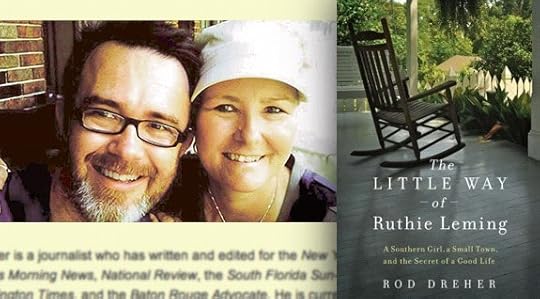
A Little Way with Big Lessons | Christopher White | CWR
A review of Rod Dreher's The Little Way of Ruthie Leming: A Southern Girl, a Small Town, and the Secret of a Good Life
At first it sounds like a familiar tale: a small-town boy eager to break free from his roots and follow the lure of city life. In doing so, he comes to reject much of his upbringing, and his new sensibilities distance him from his family and friends at home.
Plenty of memoirs and pages of literature capture similar stories. Yet for veteran journalist Rod Dreher, this narrative took an unexpected turn when his sister was diagnosed with cancer at age 40. In witnessing the tremendous outpouring of love and support from residents of his hometown, Dreher and his wife begin to rethink the significance of small town life and the value of the deep ties that can only be offered by neighbors and family members. And in seeing how his sister, an unassuming schoolteacher, courageously embraced her struggle with terminal cancer, he comes to understand that some of the greatest joys in life are the simplest ones that can be discovered close to home.
Already hailed by many critics as one of the most important books of the year, The Little Way of Ruthie Leming: A Southern Girl, a Small Town, and the Secret of a Good Life is a powerful reflection on the importance of family and community. Set in the Deep South, St. Francisville, Louisiana, Dreher’s account is an honest and very personal attempt to make sense of loss—not only of his sister, but of his own ambitions and desires. Yet, the intertwined story of Dreher and his sister is also a story of hopeful rediscovery and reorientation of life’s priorities.
At age 25 Dreher moved to Washington, DC to work as the television critic for theWashington Times, a job that he was sure would be his one-way ticket out of small-town America.
New: "The Layperson's Distinctive Role" by Francis Cardinal Arinze
Now available from Ignatius Press:
The Layperson's Distinctive Role
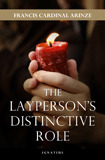
by Francis Cardinal Arinze
• Also available in Electronic Book Format
This important book by the highly regarded African prelate, Cardinal Arinze, describes in positive and simple terms who the lay person is, his distinctive role in the Church, and how the lay apostolate distinguishes the lay faithful from the clergy and the religious.
The call of lay people to be witnesses of Christ in the ordinary areas of secular life, such as family, work, recreation, politics and government, shows how demanding the apostolate of the lay people is. The book draws from the dynamic teachings of the Second Vatican Council, the riches of the 1987 Synod of Bishops on the Lay Faithful, and the emphasis on the lay apostolate by recent Popes, to present to lay people an attractive and demanding call to witness to Christ in society.
Leaders and participants of various lay groups and movements will find this book liberating and encouraging. Clerics and religious will find these considerations by Cardinal Arinze of great help, both in appreciating the limits of their own apostolates and of seeing how to put before the lay faithful the demands of their calling.
Cardinal Francis Arinze grew up in Nigeria, became the youngest Bishop in the world, and the first African Cardinal to head a Vatican office. He was the head of the Congregation for Divine Worship and the Discipline of the Sacraments. His biography, God's Invisible Hand, was published by Ignatius Press as well as Celebrating the Holy Eucharist.
Abortion: Unmasking the Demon
Abortion: Unmasking the Demon | Fr. Stanley Smolenski, SPMA | Homiletic & Pastoral Review
It is true that fatherhood is the main target of Satan’s forces, but his is a multi-pronged strategy which includes the destruction of motherhood and childhood. This is blatant in abortions.
|The spiritual dimension of abortion, based on our faith, must be addressed along with the medical, legal, political, and psychological aspects of this social aberration. We have to see beneath the exterior human activities in order to appraise the sinister aspect of distorted spiritual realities that are motivating the obvious. Then observe the corrective means directed by divine providence. Many refuse to face the facts and actually camouflage the reality to make it palatable to their deformed consciences.
That is the problem with politicians who claim to be Catholic, but whose actions show otherwise. They are to being Catholic what margarine is to being butter: mere appearance, essentially different, a label without content.
A clear idea of what results when evil pervades a society is needed. This concerns the justice of God, because our denial of his rights by sin is a denial of his rightful glory. Let us examine the Eighth Station of the Cross. Some stations say, “Jesus consoles the women of Jerusalem”—Hardly! He said to them, “Weep not for me, but for yourselves and for your children” (Lk 23:28). This calls to mind the time he was entering Jerusalem and wept over it, saying: “Jerusalem, Jerusalem…how I would gather you as a hen does her chicks; but you refused!” and “A time will come when you will be surrounded … and a stone will not be left on a stone … because you did not recognize the time of your visitation” (cf. Mt 23:37; Lk 19:44).
The refusal of the Gospel has its dire consequences. When laws are passed that make a society resemble the cities of Sodom and Gomorrah, what can be expected? Recall what they got!
The Lord constantly complained that people invoked him with their lips, but their hearts were far from him.
August 22, 2013
Why Chesterton Will Be a Saint
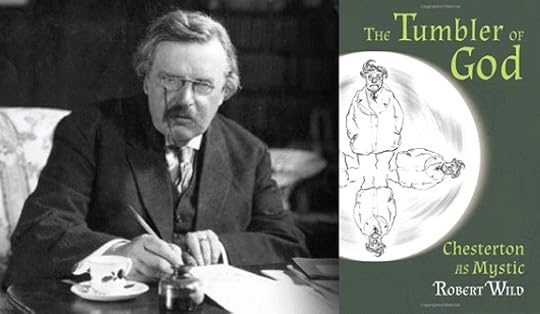
Why Chesterton Will Be a Saint | Dale Ahlquist | Catholic World Report
A review of Father Robert Wild’s The Tumbler of God: Chesterton as Mystic
Not every saint is a mystic. Not every mystic is a saint. And not every 300-pound, cigar-smoking journalist is both a saint and a mystic. But I’m quite sure at least one of them is. And I’m not alone in that opinion.
Father Wild’s book is especially well-timed. I was recently taken to task by a reviewer because I had suggested in my book The Complete Thinker that G.K. Chesterton is a mystic. And so it is convenient to have suddenly at my disposal an entire book written in defense of that one statement. But the book is well-timed for another reason. Father Wild not only argues quite convincingly that Chesterton is a mystic, but by the end of the book he also makes the case that Chesterton is a saint. Things appear to be heating up in that regard, too. And Father Wild is not just blowing holy smoke. He knows what the Church requires for sainthood. He is the postulator in the cause for Catherine de Houck Dougherty, who, incidentally, was also a mystic.
Like any good writer, including like Chesterton himself, Father Wild takes the trouble to define his terms. He surveys the work of the leading writers on mysticism and shows how they converge but also where they part ways. Mysticism has to do with a direct experience of the divine truth, an “acute awareness” not only of the Creator but of his creation. Certainly the mistake about mysticism is that we associate it with remoteness from the rest of us, a hermit in a cave, or a prophet on a mountain top. Mysticism may make a stop there, but it does not stay there. For almost every reason, Chesterton damages most of our preconceptions about mysticism, even going so far as to say that the common man is a mystic, because mysticism is sane. It grasps reality. It rejoices in the sunlight. It knows the balance and proportion of things, including the importance of important things and the unimportance of unimportant things. Or to put it in Chesterton’s own words (in a passage which unfortunately does not appear in the book):
The common man is a mystic. Mysticism is only a transcendent form of common sense. Mysticism and common sense alike consist in a sense of the dominance of certain truths and tendencies which cannot be formally demonstrated or even formally named. Mysticism and common sense are like appeals to realities that we all know to be real, but which have no place in argument except as postulates.
Chesterton tells us the things we already know, only we did not know that we knew them. The difference between him and us is that he is trying to give us the same vision he has, what Father Wild calls his “contagious happiness and inner peace…he was imbued with a kind of unpretentious beatitude that tended to convey itself to those around him.” He is trying to share his sense of wonder, his thankfulness, his joy. And the source of all these things is God.
Indeed, Robert Hugh Benson, whose too-short life and writing career just overlapped with Chesterton’s, perceived as early as 1905 that Chesterton was a mystic because of his joy, his confidence, and his common sense.
August 21, 2013
Jean Daniélou and Humanity's True Vocation
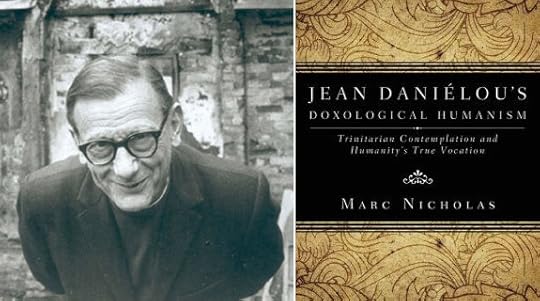
Jean
Daniélou and Humanity's True Vocation |
Carl E. Olson | CWR
An
interview with Marc C. Nicholas, author of Jean
Danielou’s Doxological Humanism
Although
not as well-known today as his fellow Jesuit Henri de Lubac and
theological contemporary Hans Urs von Balthasar, Jean Daniélou holds
an important place in twentieth-century Catholic theology, recognized
for his dialogue with other world religions, his writings on the
Church Fathers and Scripture, and his insights into the nature of
divine revelation and Tradition. Trained in philology––the study
of classical languages––and theology, Daniélou was a professor
at the Institut Catholique in Paris and a vital member of the
controversial "New Theology", or ressourcement,
movement. However, relatively little has been written about
Daniélou's theological project and vision. Now, in his book, Jean
Daniélou's Doxological Humanism : Trinitarian Contemplation and
Humanity’s True Vocation (Wipf
& Stock, 2012), Marc C. Nicholas has taken up the task of
providing an overview of Daniélou's theology, with “with
extensive reference to his vast corpus of writings by highlighting
what seems to be the key to his thought: that all human beings were
made for contemplation and that one is only truly human when one
exercises this innate calling in a Trinitarian fashion.”
CWR:
For those who might not be very familiar with him, who was Jean
Daniélou? What were some of his notable achievements as a writer,
scholar and theologian?
Nicholas:
Jean Daniélou (1905-1974) was a French
Jesuit priest who was a prolific scholar and theologian who taught at
the Institut Catholique in Paris from 1944-69, was a peritus
(“expert”) at the Second Vatican Council and was named a cardinal
in 1969.
When
looking at Daniélou as a scholar-theologian and writer concerning
Christian spirituality, it is important to remember that each of
these disciplines flows from the other. It would be an error to
trifurcate his thought into separate domains. He was always at pains
to maintain the interrelatedness of theology, history and
spirituality.
With
that in mind, Daniélou made significant contributions in the areas
of Church history, theology and spirituality. In the academic world,
Daniélou is perhaps most well-known for his expertise in the history
of the Church during the earliest centuries of Christianity. His
writings on the development of doctrine, on the great events of early
Christianity and on the great theologians of the patristic period
enjoy considerable prestige because of their value for the historian
of the Church.
Also,
Daniélou is well known for his endorsement of the ressourcement
adage, ad fonts,
or “return to the sources” which sought to reconnect contemporary
Catholicism with the great Christian sources of the past. To this
point, Daniélou, along with Henri de Lubac, established the Sources
Chretienne series in France which
inspired other non-francophone attempts to make the Church Fathers
accessible to the greater reading public.
Of
lasting importance is Daniélou’s defense of the Church’s
traditional teaching concerning the “spiritual interpretation”
(Daniélou specifically argues for typological)
of the Christian Scriptures. In his The
Bible and the Liturgy and From
Shadows to Reality, Daniélou maintains
that the modern tendency to limit the interpretation of the biblical
texts to the literal-historical meaning of the text—which modern
historical-critical methodology does—is a serious breach of
tradition and violates a holistic understanding of the text which was
protected by the spiritual interpretation of texts.
Lastly,
Daniélou is well-known as one of the catalysts to the Novelle
Théologie (a label given to Daniélou
and his confreres by his theological opponents) which emphasized a
return to the earliest Christian sources as a way to renew theology,
a revival of the historical nature of Catholicism and a rejection of
the notion that the Neo-Thomism of the 19th
and 20th
centuries was the sole arbiter of Catholic doctrine.
CWR:
Your book begins by outlining a significant “split between
theology and spirituality.” What is that split, how did it come
about, and how does Daniélou address it?
August 20, 2013
Watch CBS News feature on Dominican Sisters of Mary, Mother of the Eucharist
Singing both a capella and with the accompaniment of organ,
trumpet, and chimes, the Dominican Sisters of Mary, Mother of the
Eucharist have created a collection that is reflective of the music in
their daily community life.
This album is produced by Blanton Alspaugh, 2013 Grammy Award Winning
Classical Producer of Year. And engineered by John Newton, 3x Grammy
Award Winner.
Here is a recent CBS News piece about the Dominican Sisters and their album:
The album is now available on the Ignatius Press website.
August 19, 2013
Fighting Pride and Prejudice, Protecting the Right of Conscience
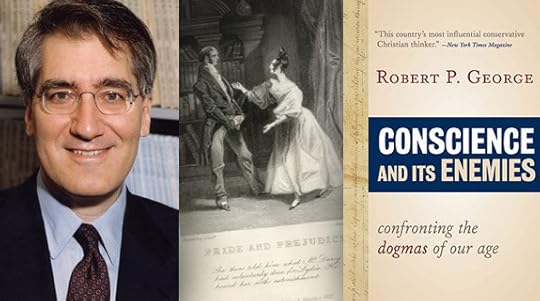
Fighting Pride and Prejudice, Protecting the Right of Conscience | Carrie Gress | CWR
Robert George’s Conscience and Its Enemies is a primer in civics and a guide to addressing the cultural Leviathan.
The well-known plot of Jane Austen’s Pride
and Prejudice revolves around a terrible mix-up by the heroine, Elizabeth
Bennet. The dashing Mr. Wickham convinces poor Lizzy that Mr. Darcy is a man of
malice, something she is already prejudiced to believe, in part due to his own
reserve. As such, she feels no remorse in refusing Mr. Darcy’s ill-fated (and
ungentlemanly) marriage proposal. Darcy, stinging from Miss Elizabeth’s
refusal, writes our heroine a letter to dispel Wickham’s lies. The rest of the
tale unfolds with Elizabeth discovering just how mistaken she had been.
What would have happened to Miss Elizabeth Bennet, one wonders, if Mr.
Darcy had decided to not write her that letter? What if, out of his own pride
and contempt for those “decidedly beneath him,” he had simply not bothered to
engage the truth?
In his latest offering, Conscience
and its Enemies: Confronting the Dogmas of Liberal Secularism, Robert
George, the McCormick Professor of Jurisprudence at Princeton University, pens
a new sort of letter from Mr. Darcy.
While it is difficult to collapse entire groups into the persona of a
19th-century gentleman, there are striking similarities that come to the
surface in George’s defense of those who believe in what James Madison called “the
sacred rights of conscience.” On the one hand, the “Wickhams” tend to use charm
and deception to convince their audiences of their moral certitude and high
ground, while the “Darcys” tend to say little until they get to the point where
they simply must say something (which is often too little too late).
“I have found that secular liberal views are so widespread as to go
largely unquestioned,” George explains in his book. “As a result, many in these
elite circles yield to the temptation to believe that anyone who disagrees with
them is a bigot or a religious fundamentalist. Reason and science, they
confidently believe, are on their side.”
Many Lizzys and Larrys of our day—the lo-fos (low-information voters)—are
ensnared in the culture that idolizes celebrity, charm, glamour, and polish,
communicated in the short sound-bite or tweet. These habits don’t provide room
for longer or deeper explanations that get to the truth. Unfortunately, their
avoidance of substance leads them to the Wickhams of the world while the Darcys
remain silent—or are persecuted into silence.
As George explains, through close scrutiny of the Wickham-types, we
learn “that it is their own views that are thinly supported—that are, as they
might say dismissively, nothing but articles of faith.”
And yet while many liberal arguments rest on shallow footing, when it
comes to issues of conscience— such as marriage, abortion, freedom of religion—George
makes it clear that conservatives are not the underdogs, that principled
positions have an intellectual pedigree worth defending that simply does not
match up to the emotive or baseless arguments its opponents make it out to be.
A primer on pressing issues
The book is divided into four sections.
Carl E. Olson's Blog
- Carl E. Olson's profile
- 20 followers





